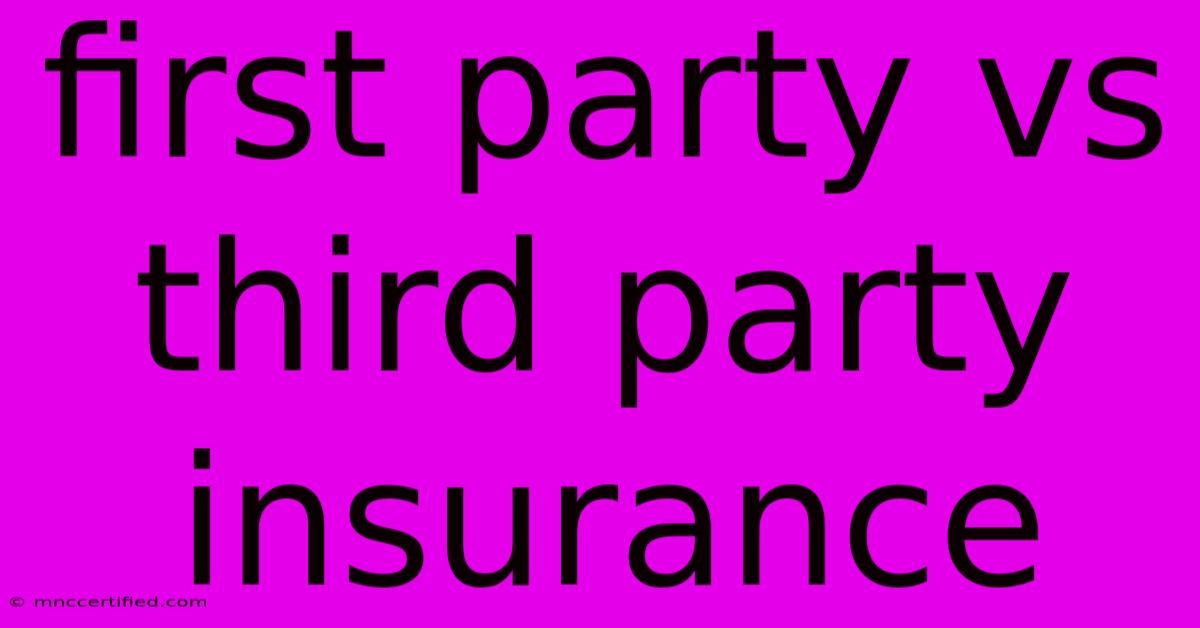First Party Vs Third Party Insurance

Table of Contents
First-Party vs. Third-Party Insurance: Understanding the Difference
When it comes to car insurance, the terms "first-party" and "third-party" might sound confusing. But understanding the difference between these two types of coverage is crucial for making informed decisions about your car insurance policy. This article will break down the basics of first-party and third-party insurance, explaining what they cover and when you might need each.
First-Party Insurance: Protecting Yourself
First-party insurance, also known as comprehensive or collision coverage, covers your own vehicle and its occupants. This means it protects you from financial losses resulting from:
- Accidents involving your vehicle: This includes collisions with other cars, objects, or even hitting a pothole.
- Natural disasters and other unforeseen events: Think damage from fire, theft, vandalism, or even hailstorms.
- Other incidents: This can include damage caused by falling objects or hitting an animal.
Essentially, first-party insurance provides financial protection for your own losses. It helps you pay for repairs or replacement of your vehicle, medical expenses for you and your passengers, and other related costs.
Third-Party Insurance: Protecting Others
Third-party insurance, on the other hand, focuses on covering damages you cause to others. This includes:
- Damage to other vehicles: This includes repairs or replacement of another vehicle you hit.
- Injuries to other people: This can include medical bills, lost wages, and other expenses related to injuries you cause to others.
- Property damage: This could involve damages to fences, buildings, or other property you hit during an accident.
Think of third-party insurance as a safety net for others. It provides financial protection for those who suffer losses because of your actions while driving.
Mandatory vs. Optional Coverage
In many jurisdictions, third-party insurance is mandatory, meaning it's required by law to drive a vehicle. This ensures that victims of accidents have some financial compensation for their losses. First-party insurance, however, is usually optional. You can choose to purchase it or not, depending on your individual needs and risk tolerance.
Choosing the Right Coverage for You
The best car insurance policy for you depends on several factors:
- Your financial situation: Can you afford the potential costs of repairing or replacing your vehicle yourself?
- The value of your car: If you have an older, less expensive car, the cost of comprehensive coverage might not be worth it.
- Your driving habits: If you drive frequently, in busy areas, or in conditions that increase your risk of accidents, comprehensive coverage might be a good idea.
Consult with an insurance agent or broker to discuss your specific needs and determine the most appropriate coverage for your circumstances.
Key Takeaways
- First-party insurance protects you and your vehicle.
- Third-party insurance protects others from your actions.
- Third-party insurance is typically mandatory, while first-party insurance is optional.
- Choosing the right coverage depends on your individual situation and risk tolerance.
By understanding the differences between first-party and third-party insurance, you can make informed decisions about your car insurance and ensure you have the right protection for your needs.

Thank you for visiting our website wich cover about First Party Vs Third Party Insurance. We hope the information provided has been useful to you. Feel free to contact us if you have any questions or need further assistance. See you next time and dont miss to bookmark.
Featured Posts
-
Fantasy Football Smith Vs Lamb Week 10
Nov 11, 2024
-
Bone Shibaswap Price Prediction 2025
Nov 11, 2024
-
Easy Jet Stock Where Will It Go In 2024
Nov 11, 2024
-
Who Is An Insured Under A Cgl Policy
Nov 11, 2024
-
Fiji Earns First Win Over Wales
Nov 11, 2024